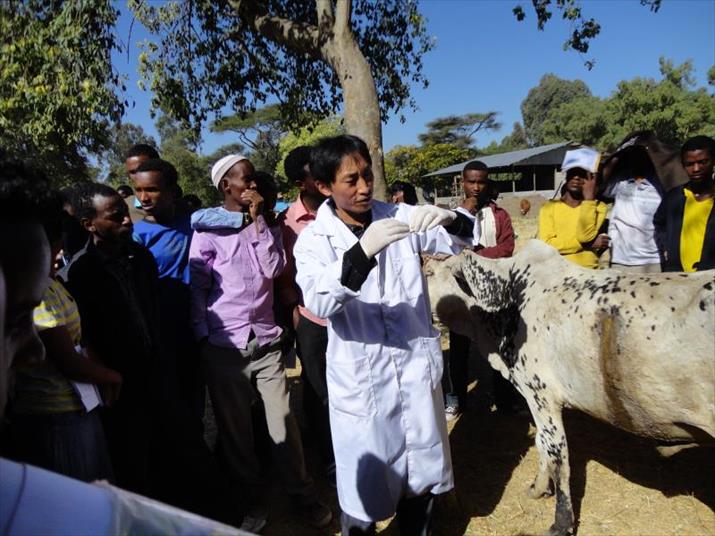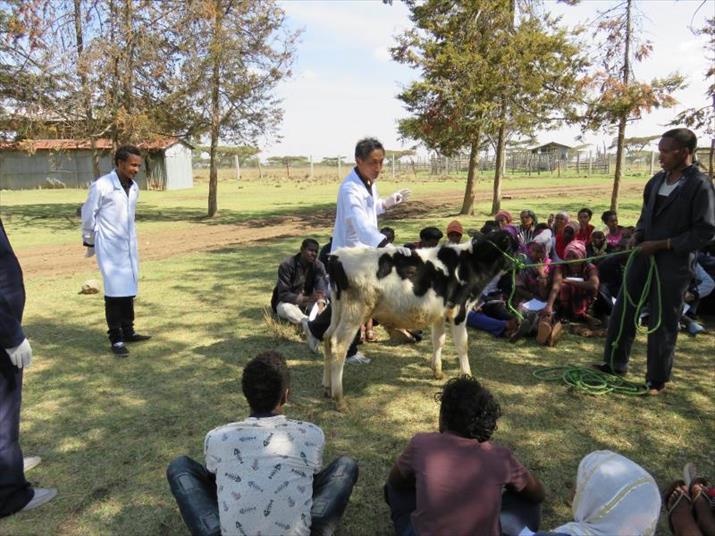|
||||||||||
| Home Nation World Business Opinion Lifestyle ChinAfrica Multimedia Columnists Documents Special Reports |
|
||||||||||
| Home Nation World Business Opinion Lifestyle ChinAfrica Multimedia Columnists Documents Special Reports |
| China |
| Keeping It Constant |
| China optimizes the agricultural aid program in Africa to ensure its continuity and effectiveness |
| By Li Xiaoyu ·2017-02-09 |

"This achievement will be recorded in the history of Burundi, and also further builds up the confidence of developing our rice growing industry through learning from Chinese rice cultivation technology," said Deo-Guide Rurema, Burundi's Minister of Agriculture and Livestock.
This rice demonstration project was one of the highlights at China Agricultural Training and Aid Conference held by China's Ministry of Agriculture (MOA) last December.
In 2016, China sent seven groups of 72 agricultural experts to five African countries, namely, Ethiopia, Djibouti, Burundi, Mozambique and Zimbabwe, said Zhang Lubiao, Deputy Director General of the Department of International Cooperation of MOA.
"Chinese agricultural experts groups made many breakthroughs in their pilot demonstration projects, which won wide recognition from all sides," said Zhang. The successful projects include a rice demonstration project in Burundi, new varieties of mushrooms cultivation pilot project in Ethiopia, high-yield hybrid rice experiment in Zimbabwe, and a fish farming demonstration project in Djibouti.
In addition, the Chinese experts groups have trained more than 6,000 local officials and technicians, transferring skills and improving the capacity of agricultural technicians in Africa.
Chinese experts have been working with their local peers, particularly in Ethiopia, to compile six textbooks for students of agricultural technical vocational education and training (ATVET) programs, addressing the shortage of quality textbooks in the ATVET colleges.
Optimizing aid program
Since 2006, MOA's Center of International Cooperation Service (CICOS) has been engaged in the selection and management of agricultural experts to foreign countries. Up to now, a total of 189 agricultural experts in 43 groups have been sent to 34 African countries, while 184 Chinese vocational teachers in 11 groups have been sent to Africa to work on the joint ATVET program.
"Most candidates are recommended by institutions under MOA, research institutes and the provincial agricultural authorities, and they have to go through oral English tests and interviews before they are selected," Wang Jing, Communication Division Director at the CICOS told ChinAfrica.
The year 2015 saw the launch of the program of one Chinese province being paired with one African country. The aim is to make the agricultural assistance program more targeted, consistent and effective, said Wang. Last year, Burundi, Zimbabwe and Mozambique were partnered with Sichuan, Anhui and Hubei provinces respectively, and now the projects are progressing well.
As a big agricultural province, southwest China's Sichuan has actively participated in the agricultural assistance project in Africa. From 2008-16, 23 agricultural experts from that province were dispatched to 11 African countries. However, in recent years, the province has also encountered a bottleneck in the selection of experts.
"The criteria of selecting experts are high in terms of professional competence and language. Young professionals who are willing to participate often cannot meet the high requirements. Thus, the experts that can go to Africa are almost [all] in their late 40s, and there are few young experts under 40 joining the assistance program," Liu Xin, Deputy Director of the Agricultural Aid Office of Sichuan Province told ChinAfrica.
According to CICOS's assessment of the agricultural aid program in Africa, Chinese agricultural personnel are competent in their technical skills and professional knowledge, but they generally do not have a good command of foreign languages, especially in veterinary, aquiculture and sericulture, which has brought problems to expert selection and program implementation.

To solve those problems, the CICOS has established a database of 800 Chinese agricultural experts. Supported by the MOA's Department of International Cooperation, the center has also drafted a foreign languages training plan for agricultural experts for the next two years.
Liu suggested interpreters should also be dispatched to Africa with the agricultural experts, so that the selection of those agricultural professionals will not be confined by their language proficiency.
Ensuring program continuity
Covering a wide range of agricultural fields, the aid programs have been implemented in many cooperation organizations in African countries. Thus, it takes a longer period for the programs to show results.
According to Wang, the agricultural experts dispatched to African countries usually work for one to two years, and there is a long interval between them and the next experts groups. Overall, the aid projects lack continuity and long-term planning.
Hu Zuobin, a senior veterinarian from Sichuan Province, has taken part in five vocational education programs in Ethiopia's Alage ATVET College and Agarfa ATVET College from November 2009 to July 2016. Hu said project continuity is the main concern of the Ethiopian side that hopes Chinese teachers can be sent to Ethiopia on a regular basis. At present, the Ethiopian ATVET project lasts about one year for each group. "Because of the one-year span of the program, when I design and plan the training and experiment demonstrations, I only consider how to complete that year's teaching task, rather than thinking too much of the next year," Hu told ChinAfrica. "Such arrangement lacks long-term planning."
"I hope the duration of the program can be extended. I think in the two months before the end of a program, Chinese teachers can discuss with the Ethiopian faculty members about the direction and requirements of the next program, which can be taken as one of the criteria for selecting teachers," Hu suggested.
To address this problem, Wang Jing said the center has made some efforts to ensure the continuity of the program. "Before starting a new program, we will communicate with the agriculture authorities in African countries to learn more about their needs, trying to ensure continuity and enhance effectiveness," she said.
Wang said now the CICOS works with the Department of Foreign Assistance of the Ministry of Commerce to carry out program investigation and make preliminary preparation for the upcoming agricultural programs in Ethiopia, Djibouti, Zimbabwe, Mozambique and Burundi. They will focus on specific programs and make a long-term and sustainable plan. Based on the program requirements, Chinese experts will be selected to ensure project continuity and effectiveness.
| About Us | Contact Us | Advertise with Us | Subscribe |
| Copyright Beijing Review All rights reserved 京ICP备08005356号-5 京公网安备110102005860号 |